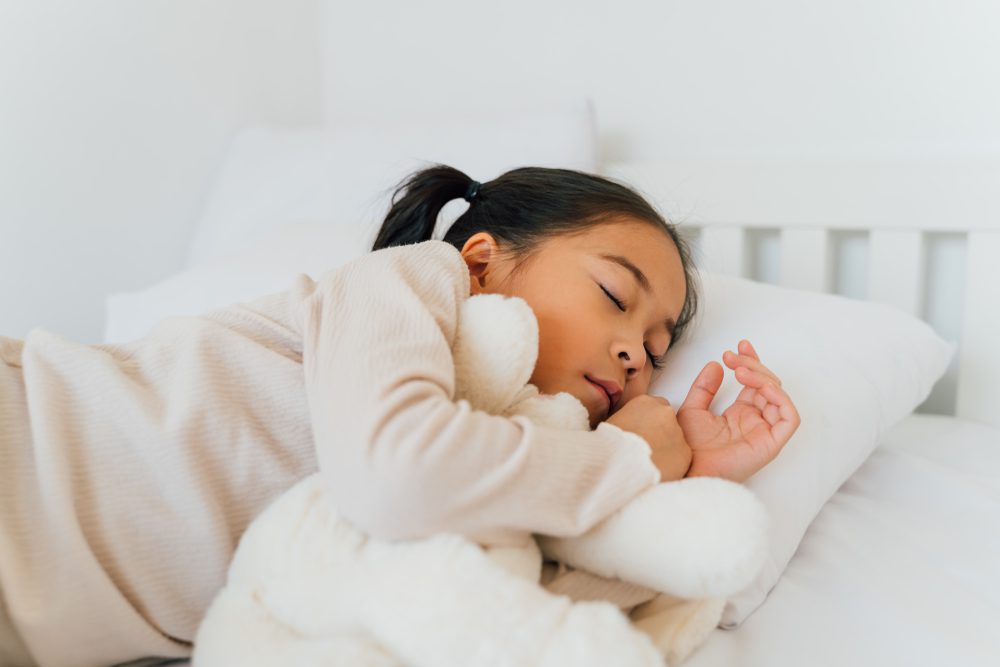Adequate sleep is essential for healthy growth and development in children. The amount of sleep a child needs will change as they grow older, peaking when they are newborns and gradually decreasing through childhood and adolescence. Parents can foster good sleep habits by helping their children adopt a consistent bedtime routine.
Unfortunately, sleep problems are common for children of all ages. Surveys show up to 50% of preschoolers and 40% of adolescents experience some sort of sleep-related issue. Children are also susceptible to sleep disorders such as sleep apnea and restless legs syndrome. Sleep disorders usually require medical intervention, so you should make an appointment with your doctor if you are concerned about your child’s sleep.
Top 5 Sleep Tips for Children

- 1 Create a calming bedtime routine that aids in the transition to sleep.
- 2 Try positive reinforcement that encourages continued healthy habits.
- 3 Encourage plenty of daytime activity and natural daylight.
- 4 Modify the child’s bedroom to be distraction-free and sleep-inducing.
- 5 Establish consistent sleep and wake times that allow the child to get their ideal amount of sleep.
Talk to your pediatrician if your child exhibits symptoms of a sleep disorder or another problem that’s interrupting their sleep.
Why Sleep Is Important for Children
Healthy sleep and a consistent bedtime routine contribute to a child’s overall happiness. Sleep has also been linked to numerous aspects of growth and development, including:
- Attention and concentration
- Cognitive development and academic performance
- Language skills and vocabulary growth
- Memory consolidation
- Mood and behavioral development
- Motor skills and learning
Not getting the right amount of sleep can also have an adverse effect on your child’s health and increase their risk of certain medical conditions. Inadequate sleep for children can lead to behavioral issues, attention problems, and learning difficulties. Researchers have also established a link between insufficient sleep and a greater risk of high blood pressure, obesity, diabetes, and mental health problems like depression. The same trends have been observed in children who sleep too much.
How Much Sleep Do Children Need?
Understanding how much sleep your child needs at different stages of their life can help ensure they grow and develop properly. Sleep guidelines for children have evolved over the years. The following recommendations are based on the latest research pertaining to children and sleep.
| Age Group | Recommended Amount of Sleep |
|---|---|
Infant, 4-12 months | 12-16 hours |
Toddler, 1-2 years | 11-14 hours |
Preschool, 3-5 years | 10-13 hours |
School-age, 6-12 years | 9-12 hours |
Teen, 13-18 years | 8-10 hours |
Newborns
Most newborns up to 3 months old have varying sleep duration and schedules. Babies circadian cycles are not fully established until about four months after they are born. Guidelines for this age group are not provided, but parents can help their newborn establish a circadian pattern by exposing them to natural sunlight during the day and keeping the lights dim in the evening.
Infants
Once their circadian rhythms are fully established, infants between 4 and 6 months old may sleep up to eight hours at a time – but since they need 12 to 16 hours of sleep every 24-hour period, they will sleep during the day and at night. Most infants take one to four naps per day, each one lasting anywhere from half an hour to two hours.
Separation anxiety is common for infants at bedtime. They may cry or become upset when you turn off their lights and close their door. You can assuage their anxiety by speaking to them in a calm, quiet voice or gently rubbing their head, but you should avoid removing them from their bed. Over time, your infant will learn you are in the next room and they will be able to fall asleep more easily.
Toddlers
Toddlers need 11 to 14 hours of sleep for every 24-hour period. They will receive most of their sleep at night and only require one or two naps during the day. This is a good time to begin establishing a nightly bedtime routine that incorporates the following:
- Nutrition: Healthy snacks before bedtime should take priority over heavy meals.
- Hygiene: Bathing, brushing teeth, and other hygienic practices are helpful for establishing a nightly routine.
- Communication: Reading to your child or singing them a lullaby can have a soothing, sleep-inducing effect.
- Physical contact: Try rocking your child, cuddling with them, or gently massaging them if they have trouble getting ready for bed.
You should also set some ground rules for your child to follow at bedtime. Establish how long the bedtime routine should take, and tell the child when they need to turn off their lights. Make it clear they are not to leave the bedroom after lights-out – but if they break this rule, keep calm and return them to the bedroom.
Preschoolers
Preschoolers between the ages of 3 and 5 need 10 to 13 hours of daily sleep. They primarily sleep at night, but some continue to nap during the day – often while they are at preschool. Studies have shown napping can strengthen learning and memory skills for preschoolers. Preschooler naps gradually become shorter up to age 4, and most children stop napping during the day by the time they reach 5 years of age.
Preschoolers often experience parasomnias, a category of sleep disorders defined as unusual behaviors that disrupt sleep. Nightmares are particularly common for this age group, affecting as many as 50% of children between 3 and 5 years. Other parasomnias like sleepwalking and bedwetting are also common.
Bed-wetting and parasomnias usually resolve on their own without medical intervention, but you should talk to your doctor if you are concerned about your child’s sleep patterns.
School-Age Children
School-age children between 6 and 12 years need roughly 9 to 12 hours of daily sleep. Most – if not all – of this sleep occurs at night. School start times help synchronize their sleep schedule, entraining them to wake up early in the morning and go to bed in the late evening. Parents should monitor their child’s sleep habits, as external factors like homework and social commitments can interfere with them getting enough sleep.
Sleep hygiene is a catchall term for habits and behaviors that influence sleep. Proper sleep hygiene becomes increasingly important as a child’s sleep patterns evolve toward those of teens and adults. Guidelines for healthy sleep hygiene include:
- Going to bed and waking up at the same times every day, including on the weekends and during school breaks
- Abstaining from caffeinated foods and beverages in the afternoon and evening
- Avoiding naps after 3 p.m.
- Reading, listening to music, or engaging in other relaxing activities before bedtime
Another way for children to ensure they sleep well is to limit their exposure to smartphones, tablets, televisions, and computers in the evening. These devices feature screens that emit blue light, which is believed to suppress the production of melatonin, a hormone that promotes feelings of sleepiness and relaxation. Melatonin levels increase when darkness falls in the evening as part of a healthy circadian cycle. Some screen time may be necessary for homework, but each hour of blue light exposure can negatively impact sleep.
Teenagers
Teenagers between the ages of 13 to 18 should get 8 to 10 hours of sleep – though meeting this benchmark can be difficult. School schedules, homework demands, extracurricular activities, and increased exposure to blue-light-emitting devices can all contribute to unhealthy sleep patterns for teens. Recent polls show roughly two-thirds of teens sleep less than 7 hours per day.
Working can compound sleep problems for teens. Studies have linked teens with jobs to earlier wake-up times, shorter sleep durations at night, and increased feelings of sleepiness during the day. Not getting enough sleep can negatively affect cognitive and academic performance for teens. Sleep-deprived teens are also at greater risk for depression and anxiety, as well as suicidal thoughts.
One way teens can improve their sleep is to abstain from nicotine and alcohol. Cigarettes and other products with nicotine can make it more difficult to fall asleep, lead to sleep fragmentation, and cause teens to feel sleepy during the day. These trends have been observed both after consumption and during the withdrawal period after people quit using nicotine products. Alcohol helps many people fall asleep, but it interferes with the natural sleep cycle during the second half of the night and can cause teens to feel tired the next day.
Shop the Best Mattresses for KidsCommon Childhood Sleep Problems
Children and teens, like adults, are susceptible to a wide range of sleep problems and disorders. That said, some sleep-related issues are significantly more common for people younger than 18. These include:
- Obstructive sleep apnea: Up to 5% of children have obstructive sleep apnea (OSA), a disorder that occurs due to a physical blockage that restricts airflow through the breathing passages. Many children experience sleep apnea due to enlarged tonsils or adenoids. Obesity can also increase a child’s risk of developing OSA.
- Behavioral insomnia of children: Insomnia is a sleep disorder defined by difficulty falling or staying asleep. Many children have trouble falling or remaining asleep when their bedtime routine is disrupted, such as after moving or the birth of a sibling. Others refuse to follow bedtime routines. Up to 30% of children exhibit one or both of these behavioral insomnia of children symptoms. Parents can help mitigate this problem by setting firm bedtime boundaries, promoting healthy sleep hygiene in the evenings, and ignoring the child when they throw tantrums after going to bed.
- Restless legs syndrome: Restless legs syndrome (RLS) is defined by painful or uncomfortable sensations in the legs when the body is at rest. People with RLS experience the insuppressible urge to constantly move their legs while lying in bed. Roughly 2% of children show symptoms of RLS. The condition is particularly common in girls, children with attention-deficit/hyperactivity disorder, and those with low iron levels. Medical treatment may be needed.
- Delayed sleep phase syndrome: People with this sleep disorder struggle to fall asleep and wake up at “socially acceptable” times. Delayed sleep phase syndrome can be particularly problematic for children and teens during their school years. As many as 16% of adolescents have this disorder. Committing to a consistent sleep-wake schedule and avoiding bright light exposure in the evening can help rectify delayed sleep phase issues.
Childhood sleep problems are common and many children won’t need medical intervention. However, parents should closely monitor their child’s sleep habits and patterns beginning at infancy to ensure they are getting enough rest each day. Talk to your doctor if you suspect your child has a sleep disorder, or if you are concerned about them not getting enough sleep.







